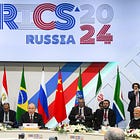The New, Old, World Order
Political universalism is dead, and older, more primal ideas will take over.
Commercial Summary: Universal political ideas and civic nationalism are both dead, at least for the new generation of right wing politicians. The coming world is one of civilisational, national, and religious conflict. The political economy of high immigration no longer makes sense. Respect for international norms and transnational bodies, and the guarantees they provide to investors, is set to collapse.
This piece is in two parts. The first is an excerpt from a chapter on the return of nationalism in my upcoming book, the second discusses the commercial implications of the change.
Start of book excerpt
The rules-based order is dead.
There will be debates among historians as to whether the mortal blow came from the bloodshed in Gaza, or Russia’s invasion of Georgia, or the US’ invasion of Iraq, or NATO’s intervention against Serbia, or its expansion to Russia’s borders. Others may attribute the coup de grâce to a future Chinese annexation of Taiwan, or to recognition of Russia’s annexation of Ukraine. It matters not.
The unilateral moment of liberal hegemony that followed the collapse of the USSR has passed. Russia is the fourth largest global economy on a purchasing power parity (PPP) basis and is outproducing all its European rivals in military goods. China’s economy is larger than the American economy by almost 30% on a PPP basis. China is now the centre of innovation in dozens of high-tech industries. America has stiff competition for global leadership, while Europe is not even a player.
That said, a more important, non-materialistic change has also occurred.
The collapse of the Soviet Union ended the war of ideas between the two universalist ideologies of American liberalism and Russian socialism. This did not lead to the global adoption of liberalism and the end of history, however. Rather, America’s failed experiments in Iraq and Afghanistan led to a drastically different realisation: values and political systems are contingent on culture and religion. Jefferson and Jeffersonian democracy can only emerge in America, under unique conditions combining the British liberal intellectual tradition, Christian sectarian diversity, and vast territories abundant in natural wealth and free from civilisational rivals. Liberal universalism is therefore a dead end.
The liberals’ embrace of Diversity, Equality and Inclusion reinforced this realisation, as did the failure of most non-European migrant communities to integrate into their Western host countries. The rise of nationalism in India, China, and Russia, and the uncompromising assertiveness of political Islam, drove the point home.
For the new generation of rising right wing leaders, the nation is a family of families, bound by blood, ancestry, and faith, not civic ideas. This is not an original perspective, but the one that animated humanity from time immemorial. Taken to its logical conclusion, it would exclude from citizenship all but ethnic kin and perhaps some co-religionists.
The New World won the Cold War, but now the Old World’s realities have defeated the idealism of the New. We have returned to politics being defined primarily by group interests, not universal ideas.
To right wing Western millennials who fought the war on terror, and to zoomers who see the dimming of their economic prospects, civic nationalism is a phantom: they would never be accepted as truly Indian or Chinese in India or China, so why should the inverse not be true?
In the deserts of Iraq and the mountains of Afghanistan, the dreamy American Wilsonian teenager came of age. He became disillusioned, and he wants Trump and America First.
We are now in Samuel Huntington’s Clash of Civilisations world, where different nations, ethnicities and religions are, by definition, rivals.
In this new, old, world order, politics is defined primarily by ethnic and religious belonging, and secondly by pragmatism and interests. Abstract constructs like free trade, property rights, and global citizenship are now seen as relics from a naïve, idealistic age, when the West was peerless and liberal progressivism was state dogma.
Now, rather than being the world’s policeman, shepherding the unenlightened to a liberal utopia, America is just another empire. There is no longer a moral or material foundation for it to be anything else. The conflict within America is over whether the empire should serve the patricians or the plebians.
End of book excerpt
It is in this light that we understand Elon Musk’s attempts to unseat the governing establishments of Britain and Germany, and Trump’s annexation plans for Canada, Greenland, and Panama. America is consolidating its control over its provinces, as it prepares to lead Western civilisation into conflict with civilisational and imperial rivals.
As such, politics in the West during Trump’s next term will revolve around a younger generation trying to wrest power from a liberal establishment that believes in a global rules-based order, Net Zero, liberal social policies, and immigration. This younger generation wants to implement older, more conservative policies instead.
Implications:
Strategic
As a nationalist empire, America will have no concern with global action on climate change, or free trade, or international law. America will turn purely pragmatic, just like China, India, and Russia.
This America will seek to expand its territory, including to Greenland, Canada, and Panama. It will also seek to consolidate its control over its key clients and allies, especially in Western Europe and Latin America. Israel will remain an integral part of the American Empire, with the US providing full support for Israel’s increasingly nationalist policies.
China and America, the titans of globalisation, will go through a de-coupling and separation of their supply chains as their relationship turns more aggressively competitive.
China’s aspiration is to inherit from the US a somewhat orderly world where the UN system and international law play a significant role.
The US is likely not going to allow this. Rather, its competition with China will create significant instability over the coming decade, as the US pressures countries to choose a side. The game between them will become increasingly zero-sum.
In this separation, India, Turkey, Brazil, Iran, and Russia are independent players seeking their own interests, trying to manage ties with both sides and balance against them. The BRICS are not a united club, but merely an incongruent collection of states seeking to trade bilaterally in their own national interest.
Gulf Arab states, Europe, Latin America, and Africa are theatres where this conflict will play out. Local and domestic rivalries in these regions will quickly take on a regional and global dimension.
Commercial
As the US seeks to regain jobs lost to Mexico, to curtail cartel activity, to deport illegal migrants, and perhaps eventually to assert its Anglo-Saxon heritage, the risk of Anglo-Latino and Catholic-Protestant conflict within America will increase over the course of the next two decades.
The military capabilities of the cartels can bring this conflict to the fore much sooner, especially given the implicit backing of the Mexican state and Trump’s allies’ support for using the American military against the cartels.





